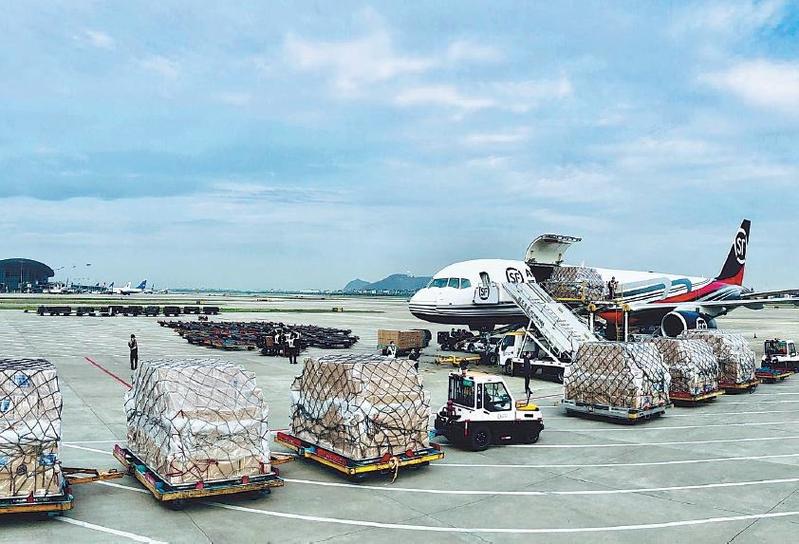 Cargoes are loaded onto an aircraft of SF Airlines, China's largest air cargo carrier, at Hangzhou International Airport in Hangzhou, capital of Zhejiang province, on March 25, 2020. (PHOTO / FOR CHINA DAILY)
Cargoes are loaded onto an aircraft of SF Airlines, China's largest air cargo carrier, at Hangzhou International Airport in Hangzhou, capital of Zhejiang province, on March 25, 2020. (PHOTO / FOR CHINA DAILY)
China is working hard to ensure the safety and efficiency of its air cargo sector together with global peers.
Air cargo has become increasingly important in the global anti-pandemic fight amid growing demand for medical supplies. Great challenges lie ahead for both government authorities and airlines.
China's civil aviation authorities have continuously introduced supportive policies, guidance and "green channels" to ensure the smooth and safe operation of airlines in their cargo activity at home and abroad.
China has provided support to the international community within its capacity while ensuring its domestic epidemic control and prevention work, said Jin Junhao, an official with the Civil Aviation Administration of China.
ALSO READ: Nation's first cargo airport could see flights late next year
China's international air cargo capacity has been gradually expanded thanks to the CAAC's multiple effective measures, such as cutting costs for carriers, establishing "green channels" for flight approvals and introducing point-to-point chartered cargo flights.
During the April 20-26 period, for example, China maintained 1,989 weekly scheduled cargo flights to 93 overseas destinations in 45 countries and regions.
The number of flights represented a 17.7-percent increase from the week earlier.
While ensuring cargo flight volume and frequency for the delivery of emergency supplies, the CAAC has also taken comprehensive safety measures, especially as some carriers are adapting their passenger aircraft for cargo missions.
The CAAC issued a notice regarding guaranteeing safety when utilizing passenger aircraft for cargo flights. It is aimed at guiding carriers to fully evaluate their passenger planes for cargo flights and ensure safe operation of such services.
Given the government's policies and guidance, major Chinese airlines have boosted their strength by increasing efficiency and capacity while expanding their air cargo transport network at home and abroad.
Thanks to the country's decades-long efforts in cultivating the civil aviation industry, major Chinese airlines have been enhancing their capabilities by expanding their fleets.
China Southern Airlines, Asia's largest air carrier by fleet size, is now commissioning 185 international cargo flights weekly to support the global fight against the novel coronavirus pandemic.
The Guangzhou-based carrier had a fleet of more than 860 aircraft by the end of 2019.
The company is participating in the global pandemic fight via its international cargo network flights to Europe, North America, Oceania, Africa, the Middle East, West Asia and Southeast Asia.
SF Airlines, China's largest air cargo carrier by fleet size, uses its all-cargo freighters to provide medical supplies and other necessities for daily life and work resumption. The airline has been exploring potential uses of its fleet of 58 all-cargo freighters and air logistics linking more than 60 destinations worldwide.
The International Air Transport Association on April 28 released a report for March air cargo performance showing a severe and immediate capacity shortfall.
The gap between transport demand and capacity must be addressed quickly "because vital supplies must get to where they are needed most", said Alexandre de Juniac, director-general and CEO of the IATA.
Chinese civil aviation authorities are adopting flexible measures to relieve gaps between cargo transport demand and the capacity of domestic and global carriers.
Since February, the CAAC has approved a total of 3,178 additional charter flights commissioned by all-cargo freighters, and 1,873 extra cargo flights carried out by the use of idle passenger aircraft, the CAAC added.
READ MORE: China's courier companies explore air cargo market
KLM Royal Dutch Airlines launched special air cargo flights linking cities in the Netherlands and China on April 13 to provide rapid transport of medical equipment and other emergency supplies, KLM China said.
During the April 27 to May 3 period, the airline operated 19 cargo flights between the Netherlands and multiple destinations in China to ensure the continuous supply of medical supplies from China.
Delta Air Lines, a major United States carrier, is now using cargo flights to maintain a China-US "lifeline" of vital supplies, according to the airline. To date, Delta has increased its China-US air cargo services to 21 flights per week.
"Increasing our cargo flights means suppliers in China can get these items to front-line workers throughout the US far more rapidly than if they were transported via cargo ship," said Shawn Cole, vice-president of Delta Cargo.


